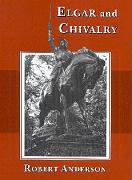|
SCHOLARSHIP AND ORIGINALITY

DAVID BURY explains the merits of
Robert Anderson's new book 'Elgar and Chivalry'
Robert Anderson's remarkable book is dedicated to Anthony Payne. Indeed
the author tells us that the inspiration for it was his attendance -- reluctantly
he admits -- at the première at London's Royal Festival Hall on 17
February 1998 of Payne's elaboration of Edward Elgar's sketches for a Third
Symphony. Dr Anderson, in the event and in common with so many, was bowled
over by Payne's great achievement. Elgar's projected Third Symphony was,
of course, to have included music first written for Laurence Binyon's play
about King Arthur, and the Elgar / Payne re-iteration of this led to Dr
Anderson's musing about Elgar and Arthur, Elgar and the Froissart
Overture, Elgar and Chivalry. This book is the result.

Elgar and Chivalry. Robert Anderson. © 2002 Elgar Editions
|
It is not a biography of Elgar. There are plenty of those available and
some of them, including Dr Anderson's own Elgar in the Master Musicians
series, are first class. Doubtless readers for whom the life and music of
Elgar are familiar will start at an advantage; others will surely quickly
turn to such background reading as a result of Dr Anderson's overview of
Elgar's world -- the world of a cultured, well-read late Victorian who also
happened to be a genius and whose hard-won fame gradually led to acquaintance
with great men.
For in one respect this is not so much a book about Edward Elgar -- Dr
Anderson is quick to point out that in some chapters he is scarcely mentioned
-- as an anthology of Late Victorian and Edwardian literature, art and architecture.
Walter Scott, Longfellow, Tennyson, Newman, General Gordon, Binyon, Bernard
Shaw are just some of the figures presented to us; the Arthurian Legend,
the St George Legend, Imperial India, Pre-Raphaelite Art some of the themes
explored. Dr Anderson's knowledge is encyclopaedic. He appears to have total
recall of all Scott's novels, and to be familiar with all the great galleries
of Europe. It is awe-inspiring! Yet this knowledge is lightly worn and perfectly
at the author's command. When reading Dr Anderson's fluent and often witty
prose one is left with no sense of an author struggling clumsily from card
to card in some gargantuan index system. One can guess that, as the author
hopes, this is a book which Elgar would have enjoyed, and one can sense
Dr Anderson's pleasure, too, in sharing his knowledge with his reader.
Continue >>
Copyright © 19 January 2003
David Bury, Surrey, UK

|

